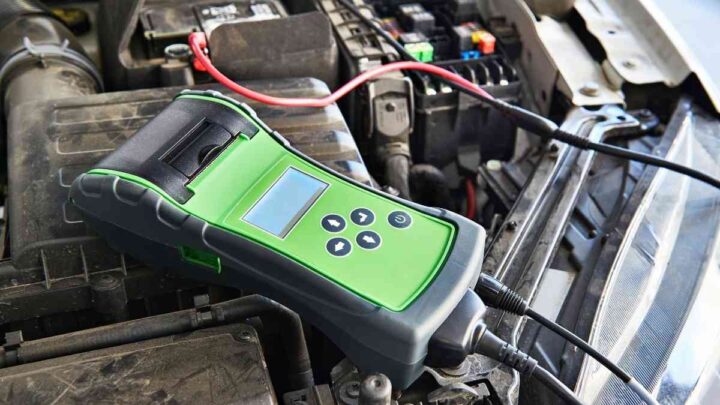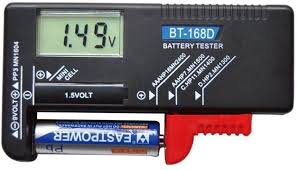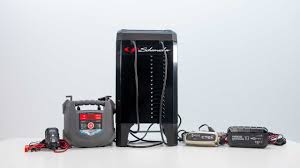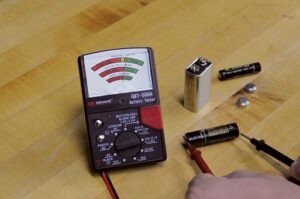How to Choose Best Digital Battery Tester: Digital Multimeter

Digital battery testers are widely used in various applications, including automotive, marine, and industrial settings. They are handy tools for diagnosing battery issues, determining battery health, and ensuring reliable performance. It typically consists of a digital display, probes or clamps to connect to the battery terminals, and circuitry to measure the battery’s parameters.
A battery tester is an electronic device designed to assess the condition of an electric battery. It can range from a basic device that measures the charge level and voltage output of the battery to a more advanced tool that evaluates the battery’s capacity to store charge and identifies any potential issues that could impact its performance and safety.
Digital Battery Tester
A digital battery tester is an advanced tool that measures the voltage of a car battery and assesses its condition using pulse load testing. This technique involves testing the battery under a dummy load to provide an accurate measurement of its capacity without straining the battery or generating heat. With thin test leads, a digital battery tester quickly measures multiple parameters and analyzes battery performance.
Despite not subjecting the battery to heavy real-world loads, a high-quality digital battery tester is considered highly accurate, providing nearly 100% precision. It is the easiest, fastest, and most precise method for testing car batteries. Additionally, when the engine is running, a digital battery tester can also verify the proper functioning of the alternator.
Here’s a general overview of how a digital battery tester works:
1. Connection.
The tester is connected to the battery by attaching the probes or clamps to the corresponding terminals. The positive probe is connected to the positive terminal, and the negative probe is connected to the negative terminal.
2. Compatibility.
Before using a battery tester, it is crucial to verify that it is compatible with the specific batteries you intend to test. While many testers are designed for common battery types such as AA, AAA, C, D, 1.5V, 9V, and button batteries, some testers are specifically made for testing 12V and 24V vehicle batteries.
3. Voltage measurement.
The digital battery tester measures the battery’s voltage and displays it on the digital screen. Voltage is an essential parameter to determine the battery’s state of charge.
4. Capacity assessment.
Some advanced digital battery testers can also assess the battery’s capacity. They may do this by applying a load to the battery and measuring how it performs under that load. The tester may display the battery’s remaining capacity as a percentage or provide an estimate of the battery’s remaining runtime.
5. Additional measurements:
Depending on the model, a digital battery tester may also measure other parameters such as internal resistance, temperature, and battery health indicators. These additional measurements can provide more detailed information about the battery’s condition.
6. Interpretation of results:
The digital battery tester may provide an interpretation of the results based on the measured parameters. It may indicate whether the battery is healthy, needs charging, or needs replacement. Some testers may also provide recommendations on battery maintenance or suggest appropriate charging methods.
While digital battery testers are generally accurate, it’s important to remember that they are designed to provide indications rather than precise measurements. Higher-quality testers typically offer improved accuracy and may include additional features, depending on the specific model.
Types of Battery Testers
The most commonly used battery testers for assessing the remaining capacity of a battery are electronic and digital models. Digital testers often come equipped with an LCD screen that presents the results in a clear and easily readable format. Depending on the specific model, the results may be displayed as bars or a graph, providing a visual representation of the battery’s capacity.
1. Electronic Battery Tester
Electronic and digital battery testers are utilized to assess the remaining capacity of batteries. Digital models, in particular, are equipped with an LCD that offers a straightforward and legible presentation of the battery test results. These results are typically portrayed as bars or graphs, depending on the specific model, facilitating rapid interpretation and analysis of the data through a user-friendly interface.
2. Domestic Battery Tester
Typically, a battery tester designed for household use is primarily used to test rechargeable cylindrical batteries like AA, AAA, and 9V PP3 batteries. These testers are compatible with common battery chemistries such as alkaline, NiCd, and Li-ion. These chemicals encompass the majority of everyday household batteries, including the aforementioned types as well as C and D batteries. A typical domestic battery tester is designed to accommodate a variety of these battery types, if not all of them.
3. Universal Battery Tester
Universal battery testers are designed to be compatible with batteries of various sizes. Like domestic battery testers, they are primarily used for cylindrical batteries. However, certain voltage meters can test a wide range of battery sizes, including small button-cell batteries as well as larger industrial and automotive batteries.
4. Car Battery Tester
Car battery testers are specifically designed for lead-acid batteries commonly used in vehicles. They are connected to the vehicle’s battery and provide a clear assessment of its health, condition, and voltage output.
Battery testers for automotive applications play a critical role in determining the condition of car batteries, especially considering the high currents drawn during start-up. Before using a car battery tester, it is essential to verify its compatibility with lead-acid batteries to ensure safe testing conditions.
The Use of a digital battery tester
Battery testers find utility in a wide range of applications and industries, serving as valuable tools for both monitoring and diagnosing battery-related issues.
- Industrial maintenance
- Automotive
- Facility maintenance
- Electrical
- Tests and measurements
- DIY and domestic purposes
Battery testers are user-friendly and uncomplicated devices that offer swift and direct outcomes, making them essential accessories for professionals and do-it-yourself enthusiasts who work with battery chargers. These devices are sometimes referred to as voltage meters.
How to Choose the Best Digital Battery Tester
When selecting a battery tester, several factors should be considered. The foremost consideration is ensuring that the tester is compatible with the specific type or types of batteries you plan to test. Additional features and functionalities can vary based on personal preferences and specific needs.
When searching for a digital battery tester, it is important to consider the following essential factors:
- Compatible battery types
- Price and your budget
- Brand loyalty
- Additional features offered
Determining the best battery tester will ultimately depend on your specific requirements. Therefore, it is crucial to conduct comprehensive research and ensure that the chosen tester aligns with your needs and preferences. By carefully evaluating different options and considering factors such as compatibility, accuracy, ease of use, display, additional features, quality, durability, and price, you can make an informed decision and select the battery tester that best suits your individual needs.
Things to consider when buying a Digital battery tester for a car
1. Tests
Advanced car battery testers, also known as analyzers, are capable of testing multiple parameters to provide a comprehensive analysis of your car battery and charging system. The results of the test are displayed automatically, indicating the condition of your battery and whether it needs to be replaced. Some testers even have a built-in thermal printer to print the test results on paper or the option to send the results via email.
Battery Test.
To determine the condition of your car battery reliably and conveniently, the most straightforward approach is to use a car battery tester. These testers analyze the battery using various parameters, depending on the specific type of tester being used.
- Voltage test: This test measures the voltage output of the battery to assess its overall charge level.
- Load test: The load test evaluates the battery’s condition by measuring the maximum amps it can deliver under load. Analog testers typically apply a load and measure the battery’s response, while digital testers analyze the data to determine the battery’s health.
- Cranking test: This test measures the voltage drop of the battery when starting the engine. By observing the voltage drop, it can indicate the battery’s ability to handle the starting load.
Charging System Test
The alternator or charging system of your vehicle can also be a potential source of issues for your car battery. Fortunately, a car battery tester can also assess the condition of your charging system.
- Charging Test: This test examines the charging voltage of the alternator to ensure it is providing the appropriate level of charge to the battery.
- Ripple Analysis (digital tester only): It helps identify any irregularities or excessive ripple in the charging system’s output.
2. Voltage
While most battery testers are designed to test 12V batteries, some models can also accommodate heavy-duty 24V or 6V batteries. It is crucial to ensure that the battery tester you choose is compatible with the voltage of your specific battery to ensure accurate testing results.
3. Battery types
Common types of car batteries include Regular Flooded, AGM flat plate, AGM spiral, EFB, Silver-Calcium, Deep Cycle, and Lithium. The battery type can usually be found on the label of the battery.
4. Battery capacity
Before testing your car’s battery, it’s important to check its capacity, specifically the Cold Cranking Amps (CCA) rating. Ensure that the battery tester you use has sufficient power to accurately test the CCA of your battery.
5. Internal battery
Battery testers can be powered either by disposable or rechargeable internal batteries or by utilizing the power from the car battery itself.
6. Standards
International quality standards such as JIS, EN, DIN, SAE, CA, MCA, ANSI, and IEC are widely recognized and can serve as benchmarks for the accuracy and safety of battery testers.
7. Display
Analog car battery testers feature an analog meter, while digital battery testers are equipped with an LCD screen or touchscreen. Digital testers offer higher accuracy and easier readability due to the presence of decimal values on the screen, which can be viewed from any angle without the risk of misinterpretation. Additionally, the backlit screens.
7 Best Digital Battery Testers Reviews

1. D-FantiX Battery Tester
D-FantiX is a well-established and highly regarded brand known for its electronic accessories and testing equipment, including a convenient battery tester.
The D-FantiX BT-168 battery tester is a top choice for newcomers to battery testing and holds the first position in this list. It offers wide battery compatibility, supporting AA, AAA, C, D, 1.5V, 9V, and button batteries.
In terms of accuracy, this battery tester utilizes an analog dial, which is expected at its price point. Additionally, it comes with a 30-day warranty, providing further assurance along with its solid construction.
Best Features:
- Compatible with AA, AAA, C, D, 1.5V, 9V, button batteries
- Uses an analogue dial to show readings
- Comes with a 30-day long warranty
Pros:
- The battery tester is highly versatile and serves as a great all-rounder for testing various battery types.
- It is designed to be user-friendly, with an easily accessible battery compartment for quick and hassle-free testing.
- The battery tester boasts a solid build quality, ensuring durability and longevity.
- A decent warranty is included, providing added peace of mind for the user.
Cons:
- Not a budget-friendly battery tester
2. Battery Storage Organizer
Battery Storage Organizer is a brand that specializes in battery storage solutions, often including a battery tester as part of their offerings. The Battery Storage Organizer battery tester is ranked third in this article due to its dual functionality of testing batteries and providing storage space for up to 180 batteries. It is compatible with a wide range of battery types, including AA, AAA, C, D, 1.5V, 9V, and button batteries.
The battery tester itself features an analog dial, which is typical for its price range. While it comes with a 30-day warranty, both the battery tester and the storage case are praised for their impressive build quality.
Best Features:
- Compatible with AA, AAA, C, D, 1.5V, 9V, and button batteries
- Uses an analogue dial to show readings
- It comes with a 30-day long warranty
Pros:
- The Battery Storage Organizer offers a highly durable and robust construction, providing peace of mind regarding its longevity and reliability.
- It provides ample storage space for a large number of batteries, accommodating up to 180 batteries, while also including a battery tester in the package.
- This option offers excellent value for money, as it serves both as a battery storage solution and a battery tester, providing convenience and practicality in one package.
Cons:
- Not a budget-friendly battery tester
3. Pgzsy 2-Pack Battery Tester
Although not as well-known as other popular brands in the electronics testing equipment market, Pgzsy offers affordable battery testers that are still a great option for budget-conscious buyers.
Pgzsy’s battery tester is the most inexpensive option mentioned in this article, making it an ideal choice for those on a tight budget. The package includes two identical battery testers, providing even more value for money. These testers can be used to assess the charge level of AA, AAA, C, D, 1.5V, 9V, and button batteries.
Due to their affordability, these battery testers feature analog dials, which is expected at this price point. However, one aspect where this battery tester falls short is its poor build quality, which reflects its entry-level price tag. Despite this, it does come with a 30-day warranty.
Best Features:
- Compatible with AA, AAA, C, D, 1.5V, 9V, button batteries
- Uses an analogue dial to show readings
- Comes with a 30-day long warranty
Pros:
- The Pgzsy battery tester pack is an excellent entry-level option, offering two testers in the box.
- It provides decent compatibility with common battery types such as AA, AAA, C, D, 1.5V, 9V, and button batteries.
- The testers feature large and easy-to-read analog dials, making it convenient to take readings.
Cons:
- A bit weak in terms of its construction and physical strength
4. Best Overall Digital Battery Tester for Car
FOXWELL BT705 Car Battery Tester
This car battery tester utilizes advanced conductance testing technology and high-quality copper clamps and wires to ensure stable communication during the testing process, resulting in reliable and accurate results. It enables quick and precise measurement of the actual cold cranking amps (CCA) and the overall health of the car battery and charging system. The LCD promptly shows the voltage and cranking time in milliseconds.
The BT705 battery tester efficiently provides information about the remaining life of your car battery, displaying battery health status on its large and easily readable backlit LCD within just 3 seconds. Additionally, test results can be conveniently printed using Bluetooth connectivity.
- Tests: Battery and charging system
- Voltage: 12V
- Battery types: All
- Battery capacity: n/a
- Internal battery: No
- Display: Backlit LED + colored LED indicator lights
- Safety features: n/a
PROS:
- Easy-to-read backlit LCD
- For 12V and 24V systems
- Comes with a protective hard case
- The device needs no internal battery
- For regular flooded, AGM flat plate, AGM spiral, GEL and Deep Cycle batteries with a capacity from 100 to 2000 CCA
- JIS, EN, DIN, SAE, CCA, BCI, GB, CA, MCA and IEC Standards
- Bluetooth printing capabilities
CONS:
- Not wireless
- No built-in printer
- No touchscreen
5. Best Budget Led Car Battery Tester
AUTDER 12V/24V Car Battery Tester
The AUTDER AD-808 automotive digital battery tester is compatible with 12V and 24V batteries used in various vehicles, including cars, motorcycles, trucks, RVs, ATVs, SUVs, boats, yachts, mowers, and golf carts. Powered by the car battery itself, it does not require internal batteries. The tester includes alligator clips and a convenient cigarette lighter plug for quick and effortless testing.
With an accuracy of approximately 0.01V, this 4-digit car battery voltmeter can measure voltage in the range of 4-30V DC. The LED display of the AUTDER AD-808 instantly indicates if the car battery needs replacement. It also allows you to check the alternator output to prevent battery damage caused by overcharging or incomplete charging.
The three-way switch on the tester allows you to select 24V battery testing on the left, 12V battery testing on the right, and real-time alternator testing in the middle position.
While being a basic and affordable car battery tester, the AUTDER AD-808 provides a quick assessment of the battery and charging system’s overall condition.
Specs:
- Tests: Battery and charging system
Voltage: 12V / 24V
Battery types: All
Battery capacity: n/a
Internal battery: No
Display: LCD with LED indicators
Safety features: Yes
PROS:
- Affordable
- Battery and charging system instant testing
- Comes with alligator clips as well as a cigarette lighter plug
- For 12V and 24V systems
- Accurate 4-digit led-display (+/- 0.01V)
- The test range is 4-30V DC
- Safety features: reverse polarity, high and low voltage
- Needs no internal batteries
CONS:
- Looks and feels cheap
- Very basic
FAQs Digital Battery Tester

What is digital battery load tester?
Digital battery load testers provide more precise and accurate readings compared to analog testers. They typically have an LCD screen or touchscreen display that shows various parameters such as voltage, current, and battery capacity. These testers often offer additional features like built-in diagnostics, automated testing, and the ability to store and analyze test results.
How to test a battery with a digital multimeter?
To test a battery using a digital multimeter, you can follow these steps:
- Set the multimeter: Turn on the multimeter and set it to the DC voltage (V) mode. Choose a voltage range that is higher than the expected voltage of the battery. For example, if you are testing a 12V battery, set the multimeter to a range higher than 12V.
- Connect the multimeter: Take the red probe from the multimeter and connect it to the battery’s positive terminal. Then, take the black probe and connect it to the battery’s negative terminal.
- Read the voltage: Once the probes are securely connected, the multimeter will display the voltage reading on the screen. This reading indicates the voltage of the battery.
-
Interpret the reading: Compare the voltage reading with the expected voltage of a fully charged battery. For example, a 12V battery should ideally read around 12.6-12.8V when fully charged. If the reading is significantly lower, it may indicate a discharged or weak battery.
What is digital battery analyzer?
A digital battery analyzer, also known as a battery diagnostic tool or battery analyzer, is a specialized device used to assess the condition and performance of batteries. It is designed to provide more comprehensive information about a battery’s health beyond just measuring its voltage.
Digital battery analyzers often have a digital display that presents the test results and may include additional features such as data logging, test history storage, and the ability to print or export test reports.
These analyzers are commonly used in automotive, marine, and other applications where battery health and performance are critical. They provide more comprehensive insights into the battery’s condition, allowing for better maintenance and decision-making regarding battery replacement.
Read More:
- Xbox Controller Battery Life: 5 Best Xbox Custom Controller
- Innova Charger & Disc Review: 13-Speed Driver
- Ricoh GR Digital iii vs Ricoh GR iiix Specs: Best Review 2024
- What is Google Intel Gemini Lake Chromebook: Best Deal
- Optima Digital 400 12V Performance Maintainer Battery Charge
- How to Choose the Best Digital Battery Tester 12v





